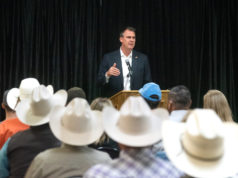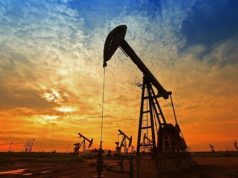
On April 22 (Earth Day), leaders from around the world will be gathering at U.N. headquarters in New York City for a historic signing of the climate agreement that was reached in Paris this past December.
Given all of the conflict and competing interests in the world, how is it possible that 195 nations could come together and agree upon dramatic reductions in carbon emissions?
Do they not understand the costs involved in making such a huge transition in energy usage? Do they not understand the fragility of the global economy? Do they not understand the number of jobs that will be lost if fossil fuels are going to be phased out and replaced by wind and solar?
I can imagine that many people in Oklahoma are scratching their heads and wondering why such bold action would be necessary.
The world leaders who gathered in Paris last December at the climate change summit recognized that the science of climate change is settled and that action is required immediately. This agreement on a plan of action may be a surprise to some. Many people have not looked at the data. For those who have, the message is clear.
Climate scientists agree that past changes in the earth’s climate have taken place over thousands of years, but never before has the climate changed so rapidly. There is every reason to believe that the massive release of carbon pollutants is the reason for rising temperatures. Military leaders see that climate change has already been disruptive to established governments, as food supplies have been affected by changes in the weather. Oceanographers have looked at melting sea ice and rapidly rising oceans. Biologists have examined species extinction that is happening as a result of rising temperatures. Weather experts have looked at the rapid increase in extreme weather events like flash floods and hurricanes.
As information about climate change has come out gradually over the past three decades, there has been some disagreement regarding the exact nature of the threat, and policy experts have disagreed regarding how quickly humanity must respond in order to avert disaster. Some of us have taken this disagreement as a sign that we could wait — we can ignore the problem, for now. We imagined that the day would come sooner or later when all the information would be in, the dust would settle and then we could formulate a clear plan of action based on more solid evidence.
Sometimes we don’t like to look at difficult problems. We hope that we will be magically rescued from having to make difficult choices. Maybe a new discovery or technological breakthrough will make this transition unnecessary. This is called a state of denial. We are by no means alone in this denial, but we must wake up and pay attention to this very real threat to our future.
I am the first to admit that scientists are sometimes wrong and a degree of skepticism is often justified when a new global threat is announced. Imagine that a doctor has told you that your child may have cancer and that it may be terminal if not treated immediately. You might seek a second opinion, but you wouldn’t wait too long. After 20 years of largely fruitless diplomacy, the governments of the world are finally starting to take the problem seriously. The deal reached in Paris in December commits every country in the world to take steps toward a significant reduction in carbon emissions.
The world’s leaders and experts have taken their time in deciding on a course of action. For over 30 years, mountains of data have been gathered and thoroughly examined by climate scientists, economists and political leaders. The vast majority have concluded that now is the time for decisive action even if some questions remain unanswered. The time to wait for further research has already passed. There is too much at stake to do nothing or ignore the problem.
The transition that the scientists are telling us is needed will not be easy. Jobs and profits will be lost. Industries will become obsolete. Change will happen, and it will not be easy for everyone. This beautiful city and state has been developed with profits from the oil and gas industry. Every resident of Oklahoma has benefited to some degree or another. Many leaders in the oil and gas industry have been civic-minded and generous. The vast majority of those who have worked in the oil and gas industry have been honest, hard-working people who are good neighbors and who love their children. They also had no clue about the long-term consequences of releasing such massive quantities of carbon into the atmosphere.
A lack of clear and convincing evidence may have caused some of us to delay supporting meaningful action on climate change. The great American writer Upton Sinclair said, “It’s very hard to convince a man of something when his salary depends on his not understanding it.” Whatever has been the reason for our reluctance to act, the time is now for serious action.





















